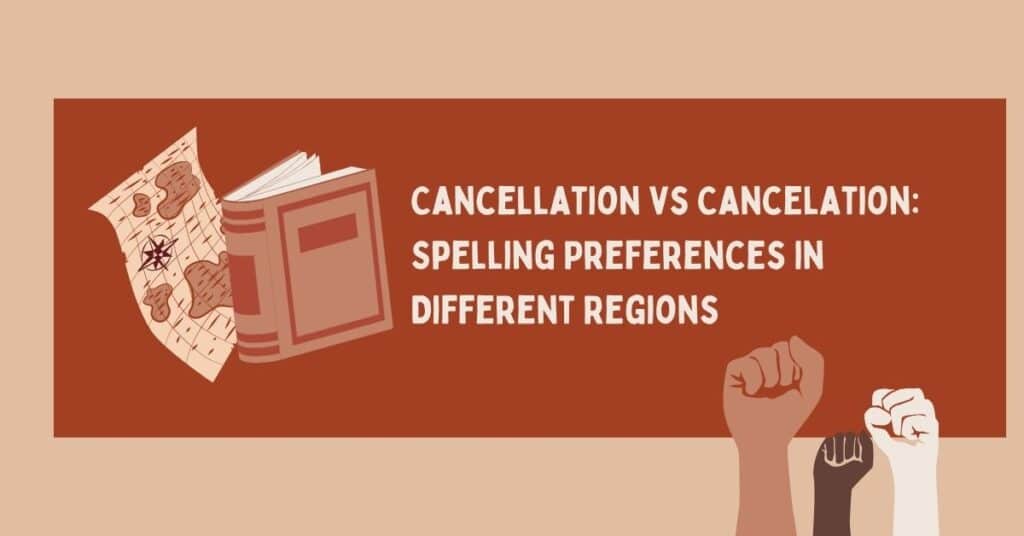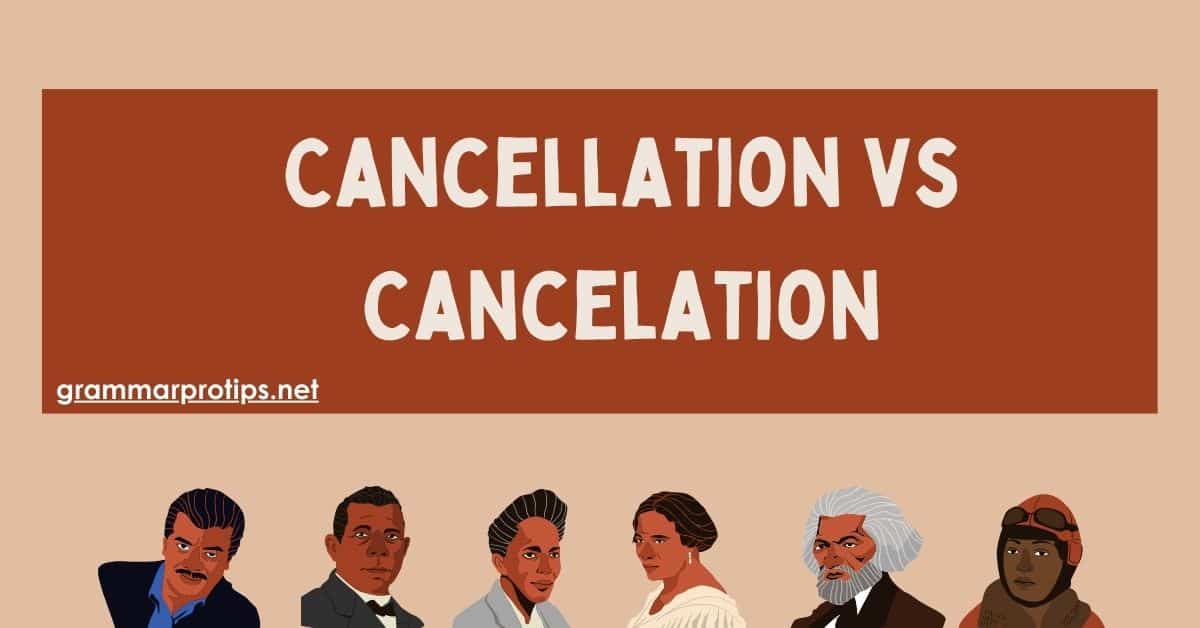When it comes to the English language, some words seem to create confusion even among the most seasoned writers and speakers. A prime example of this is the debate between cancellation and cancelation.
Both terms refer to the act of calling off or revoking something, but the spelling can vary depending on the region or style guide being followed.
So, which one is correct? Let’s break it down in detail and explore how these words are used, where they differ, and what style guides recommend.
Understanding “Cancellation” and “Cancelation”
At first glance, cancellation and cancelation seem very similar. After all, both words have the same meaning: to revoke, annul, or call off an event, agreement, or plan.
However, cancellation is the more commonly accepted spelling in many regions, particularly in British English, while cancelation is often used in American English, though less frequently.
Cancellation vs Cancelation Meaning
Both words share the same definition: the act of stopping something from happening. Whether it’s a cancelation fee from a hotel for a missed reservation or a cancellation letter notifying someone that an event has been called off, the meaning remains unchanged.
In everyday usage, though, cancellation tends to take the lead in both formal and informal writing.
Example 1:
- Subject: Hotel Reservation Cancellation Hi Karen, I wanted to let you know that your booking at the Sunshine Resort has been canceled due to unforeseen circumstances. Please note that a cancellation fee will apply to your reservation as per our policy. Best regards,
Jessica, Reception Desk
In this example, cancellation clearly refers to the process of revoking a hotel booking.
Example 2:
- Subject: Event Cancelation Notice Dear Team, We regret to inform you that the meeting scheduled for tomorrow has been cancelled. Please check the calendar for the new date. Kind regards,
Michael, Project Coordinator
In this case, cancelation is used interchangeably with cancellation, despite the fact that cancellation is generally favored in such official contexts.
Cancellation vs Cancelation: Spelling Preferences in Different Regions

Spelling preferences play a significant role in the distinction between these two forms. Let’s explore how cancellation and cancelation are treated across regions.
Cancellation or Cancelation AP Style
In the United States, many people follow the AP (Associated Press) style guide for writing. This guide standardizes many aspects of grammar and spelling. According to AP style, the correct spelling is “cancellation” with two L’s. This is important to remember when you are writing in a professional or journalistic context.
On the other hand, the American Heritage Dictionary lists cancelation as an alternative, though less common. Still, most American publications, blogs, and businesses tend to default to cancellation, especially when writing for a larger audience.
Example 3:
- Subject: Podcast Episode Cancellation Hi Sarah, I wanted to let you know that the cancellation of today’s podcast recording is due to unforeseen technical issues. We hope to reschedule it as soon as possible. Cheers,
Ben, Podcast Host
Cancelled or Canceled: Reddit Discussions and More
It’s worth noting that cancelled (with two L’s) vs. canceled (with one L) often comes up in debates online. For instance, on Reddit, the terms “canceled podcast” and “cancelled flights” are commonly discussed. The confusion arises because both spellings are valid depending on where you’re from.
- British English: Cancelled (two L’s)
- American English: Canceled (one L)
Some people argue that cancelled or canceled doesn’t matter much when it comes to informal writing, but the distinction becomes critical in formal documents and style guides.
Differences in Pronunciation and Use in Context
The spelling difference between cancellation and cancelation doesn’t typically affect pronunciation. Whether you’re using one L or two, the word sounds the same in everyday speech. It’s the spelling that changes depending on region and formality.
Example 4:
- Cancelled Cheque: A cheque that is invalidated and no longer usable. The term cancelled cheque is used widely in both British and American English, but the American style might prefer using “canceled” without the double L.
Key Terms in the Context of Cancellation or Cancelation
Let’s highlight some common phrases that often come up in discussions about cancellation or cancelation. These terms should help clarify how these words fit into the wider conversation.
Cancelation Fee
A cancelation fee refers to a charge that is applied when someone cancels an event, reservation, or contract. Hotels, airlines, and even service providers often include this fee in their policies to compensate for lost revenue or inconvenience caused by last-minute changes.
Example:
- Subject: Cancelation Fee Policy Dear Client, Please be advised that any cancelation made within 24 hours of your appointment will incur a cancelation fee. We encourage you to let us know in advance if you need to reschedule. Sincerely,
Jonathan, Customer Service Representative
Cancelation Letter
A cancelation letter is a formal document sent to notify someone about the cancellation of a service, agreement, or event. Whether you’re canceling a subscription, an event, or a contract, the letter will outline the reason for the cancellation, any penalties or fees involved, and the next steps.
Example:
- Subject: Cancelation Letter for Subscription Service Dear Customer, We regret to inform you that your subscription to our Premium Service will be canceled effective immediately due to non-payment. Please contact customer support if you wish to resolve this issue or reactivate your account. Best regards,
Clara, Subscription Support
Cancellation in Spanish
If you’re learning Spanish, you might want to know how to express cancellation in that language. The word for cancellation in Spanish is “cancelación”, which directly mirrors the Spanish form of the word.
Example:
- La cancelación de su vuelo fue confirmada a las 10 AM.
(The cancellation of your flight was confirmed at 10 AM.)
How to Choose Between Cancellation vs Cancelation?

To choose the correct spelling between cancellation and cancelation, the key is understanding the context in which you’re writing.
Tips for Choosing the Correct Spelling:
- Follow Regional Preferences: If you’re writing for a British audience, use cancellation. For American readers, you can go with either spelling, but cancellation is more widely accepted.
- Consider the Style Guide: If you’re writing for an organization or publication, check their preferred style guide to see whether they follow AP style or another standard.
- Check Consistency: Whatever you choose, stay consistent. Don’t mix the two spellings within the same document.
Table: Common Differences Between Cancellation and Cancelation
| Aspect | Cancellation | Cancelation |
|---|---|---|
| Preferred Region | British English, AP Style | American English (less common) |
| Meaning | Revocation of an event, agreement, or plan | Same as “cancellation” |
| Common Usage | More widely used in formal contexts | Less frequent, but still accepted in America |
| Example Usage | “The cancellation of flights was announced.” | “The cancelation of the event was due to weather.” |
Conclusion: Cancellation vs Cancelation
When you find yourself stuck between cancellation and cancelation, don’t stress too much—it’s a subtle difference that doesn’t often affect meaning. However, choosing the right one can depend on where you’re from, the formality of your writing, and which style guide you’re following.
In most cases, cancellation is the preferred spelling, especially in formal writing and journalism (such as the AP style). On the other hand, cancelation is still seen in certain American contexts, though it’s becoming less common.
As long as you are consistent in your usage and mindful of the context, both spellings are understood and accepted.

Sienna Mauldon is a passionate writer and grammar expert. On her blog, she shares easy-to-follow guides to help readers master grammar rules and improve their writing. With a love for language and teaching, Sienna makes grammar simple and fun for everyone, from beginners to experienced writers.








